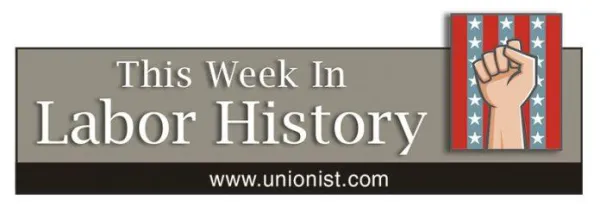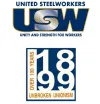This week in labor history: November 28-December 4

NOVEMBER 29
1934 – Clerks, teamsters and building service workers at Boston Stores in Milwaukee strike at the beginning of the Christmas rush. The strike won widespread support—at one point 10,000 pickets jammed the sidewalks around the main store—but ultimately was lost. Workers returned to the job in mid-January with a small pay raise and no union recognition.
1966 – The SS Daniel J. Morrell, a 603-foot freighter, breaks in two during a strong storm on Lake Huron. Twenty-eight of its 29 crewmen died; survivor Dennis Hale was found the next day, nearly frozen and floating in a life raft with the bodies of three of his crewmates. He had survived for nearly 40 hours in frigid temperatures wearing only a pair of boxer shorts, a lifejacket, and a pea coat.
1999 – National Labor Relations Board rules that medical interns can unionize and negotiate wages and hours.
NOVEMBER 30
1854 – “Fighting Mary” Eliza McDowell, also known as the “Angel of the Stockyards,” born in Chicago. As a social worker, she helped organize the first women’s local of the Amalgamated Meat Cutters Union in 1902.
1951 – More than 12,000 members of the Insurance Agents Union strike in 35 states and Washington, D.C., against the Prudential Insurance Co.
1999 – Unionists and activists shut down a World Trade Organization meeting in Seattle, Wash.
DECEMBER 1
1913 – The Ford Motor Co. introduces the continuously moving assembly line which can produce a complete car every two-and-a-half hours.
1930 – Kellogg cereal adopts a six-hour day.
1955 – African-American Rosa Parks refuses to go to the back of a Montgomery, Ala., bus, fueling the growing civil rights movement’s campaign to win desegregation and end the deep South’s “Jim Crow” laws.
DECEMBER 2
1911 – A Chicago “slugger,” paid $50 by Labor unions for every scab he “discouraged,” described his job in an interview: “Oh, there ain’t nothing to it. I gets my fifty, then I goes out and finds the guy they wanna have slugged, then I gives it to ’im.”
1954 – The U.S. Senate votes 65-22 to condemn Sen. Joseph McCarthy (R-Wisc.) for “conduct that tends to bring the Senate into dishonor and disrepute.” McCarthy was a rabid anti-Communist who falsely accused thousands of Americans, mostly people who supported Labor, civil rights and other progressive causes, of being traitors.
2009 – Court documents filed in Boston say Walmart Stores Inc. has agreed to pay $40 million to 87,500 Massachusetts employees who claimed the retailer denied them rest and meal breaks, manipulated time cards and refused to pay overtime.
DECEMBER 3
1866 – Textile strikers win 10-hour day, Fall River, Mass.
1867 – The San Francisco Board of Supervisors passes an ordinance setting an eight-hour workday for all city employees.
1919 – Canada’s Quebec Bridge, spanning the St. Lawrence River, opens to traffic on this day after the deaths of 89 construction workers in the course of the job. A flawed design was blamed for a 1907 collapse that killed 75; another 13 died in 1916 when a hoisting device failed as the central span was being lifted.
1946 – General strike begins in Oakland, Calif., started by female department store clerks.
1976 – Some 5,000 union construction workers in Oahu, Hawaii, march to City Hall in protest of a proposed construction moratorium by the city council.
2001 – Arrests begin in Middleton, N.J., of teachers striking in violation of a no-strike law. Ultimately 228 educators were jailed for up to seven days before they were released following the Middleton Township Education Association’s agreement to take the dispute to mediation.
DECEMBER 4
1943 – President Roosevelt announces the end of the Works Progress Administration (WPA), concluding the four-year run of one of the American government’s most ambitious public works programs. It helped create jobs for roughly 8.5 million people during the Great Depression and left a legacy of highways and public buildings, among other public gains.
1952 – UAW President Walter Reuther elected president of the Congress of Industrial Organizations.
(Compiled by David Prosten, founder of Union Communication Services)
